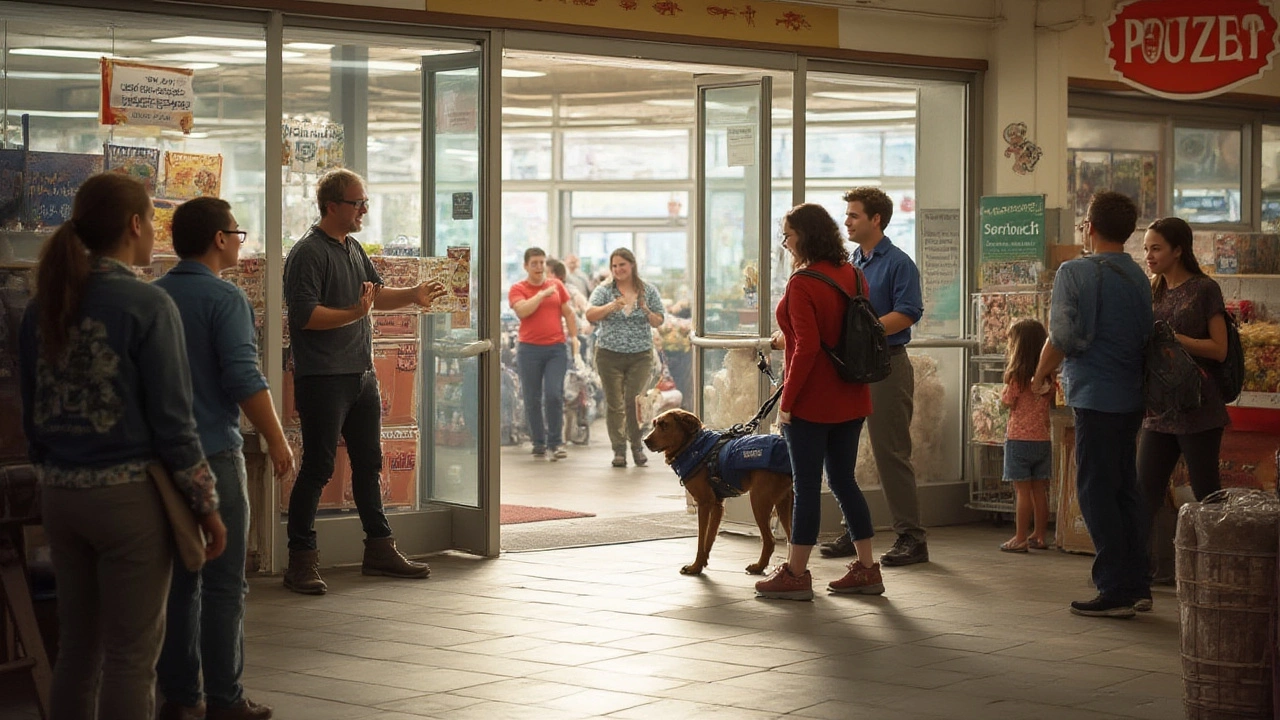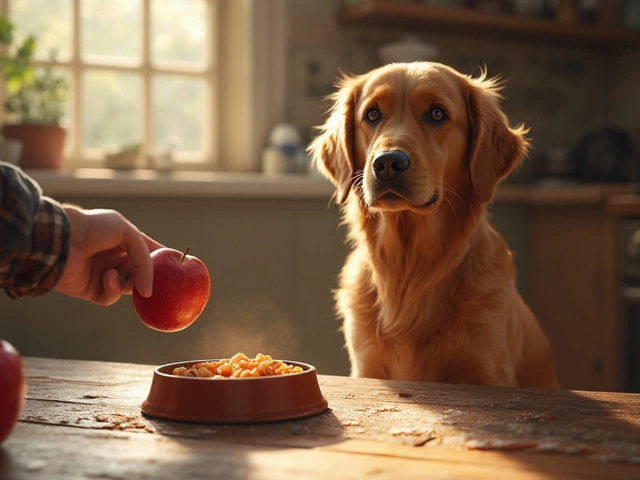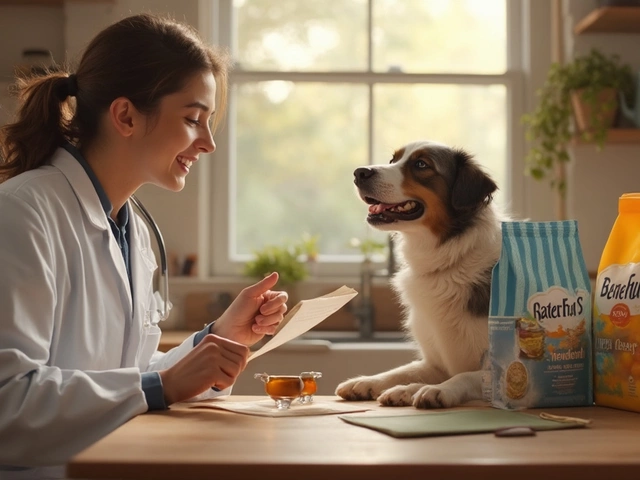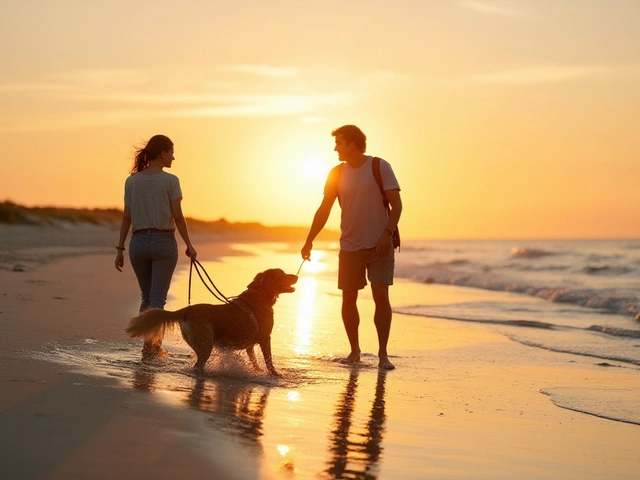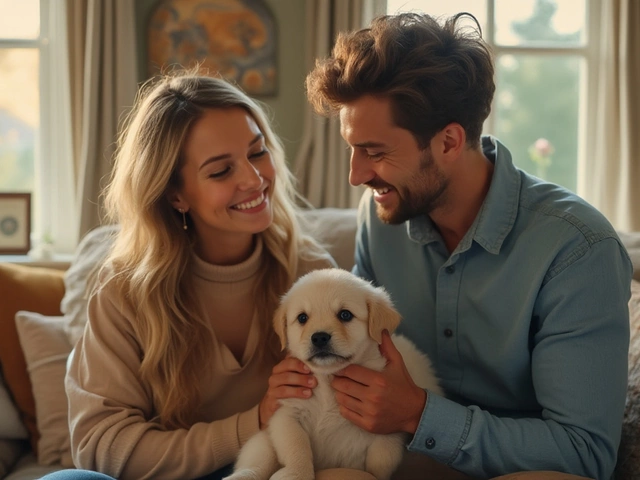Picture this: you’re juggling a leash and a shopping list, your pup drooling at your side while you ponder which lettuce looks less sad. But hang on—are dogs even allowed inside grocery stores in Virginia? If you’ve felt that pang of worry just as you reach for the sliding doors, you’re not alone. The answer isn’t always obvious, and depending on whether your pooch wears a vest might change everything. Health codes, federal laws, and individual store policies make this a trickier subject than it seems. Those adorable puppy eyes might persuade you, but state regulations probably won’t.
What Virginia Law Says About Dogs in Grocery Stores
First things first: when it comes to bringing dogs into grocery stores, Virginia law’s got some clear boundaries. State health regulations mirror federal Food and Drug Administration (FDA) codes that say, simply put, "no animals" in the area where food is prepared, stored, or sold to the public. Why? The main reason’s about sanitation. Even the friendliest, furriest companion can be a germ-carrier or a trip hazard in a busy market. Virginia’s Retail Food Regulations (12VAC5-421) make it pretty straightforward—dogs aren’t allowed where groceries are sold, unless they're specifically exempted by another law.
But it’s not just some made-up rule to put a damper on your errands. Grocery stores fall into a public food establishment category, and they’re inspected for compliance. If you waltz in with your husky, the store risks getting written up or even fined by the local health inspector. It’s true whether the store’s a massive Wegmans or the corner food mart. Employees have pretty clear instructions: ask non-working dogs and their owners to leave. Think about it—if you saw a poodle sniffing the apples, you’d probably avoid buying them. There’s also a real risk for folks with allergies, or kids who panic around dogs.
Of course, this doesn't mean every public space has the same policy. There’s a difference between a pet-friendly brewery with a patio and a grocery aisle crammed with food displays. The only exception baked into Virginia’s code is for service animals (and, to a much lesser extent, miniature horses that meet the ADA definition), but we’ll come back to that in a second. So, bottom line: under state health code, everyday dogs aren’t allowed in grocery stores.
The Service Animal Exception and What It Really Means
So your friend mentions they saw a golden retriever in the dairy section last week. What gives? Most times, if you spot a dog in a Virginia grocery store, it’s probably a legally protected service animal. Under federal law—the Americans with Disabilities Act (ADA)—service animals have an absolute right to enter grocery stores regardless of the state’s usual health and safety rules. The catch: only dogs (and sometimes miniature horses) are considered service animals, and they must be trained to perform specific tasks for a person with a disability.
Virginia follows the ADA, so grocery stores don’t get to pick and choose which service animals they allow. But don’t confuse "service dog" with "emotional support animal" or "therapy dog." As sweet as emotional support dogs are, they don’t have the same federal or state protection to enter grocery stores. ADA rules are strict. Store staff can ask only two questions: "Is this a service animal required because of a disability?" and "What work or task has the dog been trained to perform?" But they can’t require you to show paperwork or make you explain your disability.
This isn’t just a technicality. If a grocery store asks a legit service dog team to leave, they’re risking a legal mess. On the flip side, falsely claiming your dog’s a service animal is considered fraud in Virginia. Not to mention, it undercuts people who genuinely need their dogs to navigate the world. So if you need to bring a service dog with you, you’re protected by federal and state laws—no further questions asked.
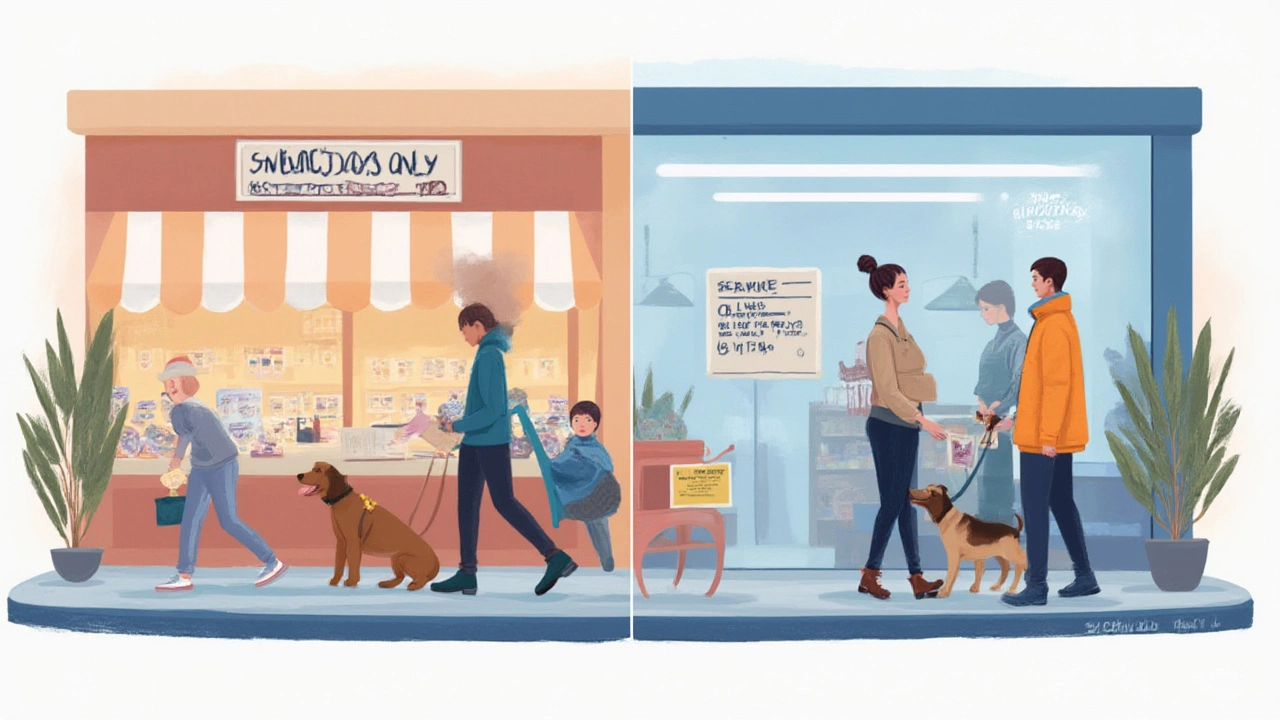
What About "Dog-Friendly" and Small Local Stores?
This is where things get interesting. Hit Google for “dog-friendly grocery store Virginia,” and you’ll find plenty of debate, but not a whole lot of facts. Some smaller, local stores or markets try to build a quirky, inclusive reputation—they might even have signs with paw prints. Outdoor farmers’ markets sometimes welcome leashed dogs, especially if produce is pre-packaged. But here’s what most folks don’t realize: even local independent stores are on the hook for state health regulations. No matter how pet-friendly they want to be, they can’t just say “sure, bring the pup in!” if they serve unpackaged food or drinks.
There’s some gray area with specialty stores. Bakeries, delis, and coffee shops with patio seating might let dogs on the outside seating area. But as soon as you step inside where food’s handled, those rules swing into place. Similarly, some pet supply chains or hardware stores let shoppers bring pets, but that doesn’t override grocery restrictions. If you spot “pet-friendly” on Yelp for a Virginia grocery, take that claim with a grain of salt, and always double-check with store staff before unleashing Fido.
One exception: pop-up shops or events like “doggy day” at outdoor farmers’ markets. If you’re outdoors, not all state retail food rules apply the same way, as long as the vendors keep animals away from the food handling areas. But again, these are rare, and you’ll usually see clear signs telling you what’s allowed.
Tips for Dog Owners Shopping for Groceries in Virginia
If you’re dealing with errands and a canine friend, you’ve probably faced the embarrassing “Sorry, no dogs allowed” at least once. Here’s what you can do to make grocery runs easier—without breaking any rules or risking angry glances from store managers.
- Don’t assume “dog-friendly” applies to grocery stores. A cafe or boutique might welcome pets, but food safety laws lock down grocery store policies across the state.
- Plan shopping times. Shop when it’s cool outside if you need to leave your pup in the car for a few minutes (never during Virginia’s hot summers). Better yet, leave your dog at home or take turns running errands with a friend or family member.
- Ask about curbside pickup. Tons of Virginia groceries offer online ordering with curbside pickup. It’s a lifesaver—especially if your dog isn’t a service animal.
- Find dog-friendly shopping centers. Some malls or strip plazas have public outdoor seating or green areas. Bring someone to wait outside with your dog while you run inside. Many dog parks are near shopping centers now, which can help.
For dog owners who rely on service animals, don’t hesitate to stand up for your rights, but understand the store employees’ duty to ask about your dog’s role. Keep your dog close, avoid letting them sniff or jump around, and be respectful of shoppers who might not be dog fans. Anxiety-ridden pups do better waiting at home, and remember—everyone’s grocery trip is smoother when the only thing drooling in produce is the kale.
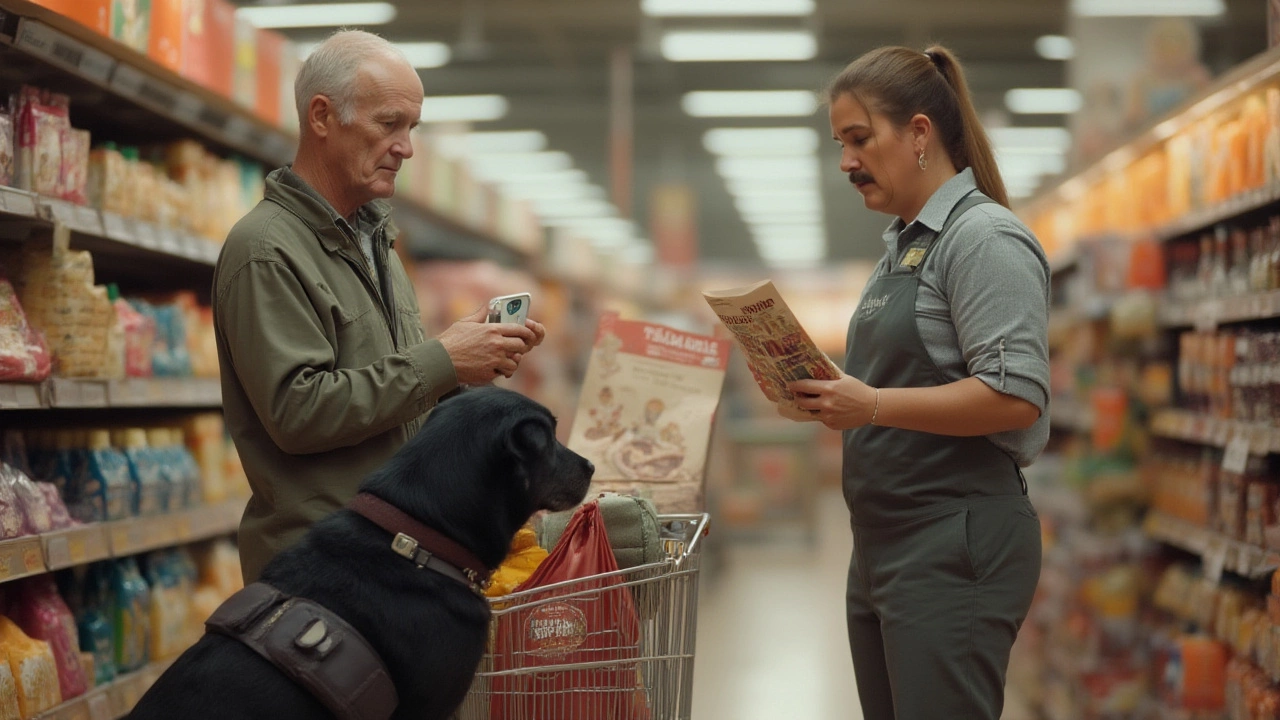
Interesting Facts and Frequently Asked Questions
If you’re the type to want receipts for every policy, here’s a roundup of facts and the answers to questions people ask all the time in Virginia.
- Certified service animals are the only dogs allowed inside grocery stores. Even tiny puppies in purses or emotional support animals aren’t legal, no matter how well-behaved.
- Virginia’s 2025 updates to its retail food code didn’t change this. The rules remain strict: human health trumps pet companionship in food-handling areas.
- Fake service dog vests are a growing problem. Buying one online doesn’t make your dog a service animal, and Virginia law allows for hefty fines for those caught misrepresenting a pet. It’s not worth the risk.
- Publix, Kroger, Wegmans, and other major Virginia chains all maintain a “service animals only” policy—with regular training for employees on how to gently but firmly enforce it.
- If you’re a visitor to Virginia, don’t count on different rules at small independent markets. Health code doesn’t budge, and fines for noncompliance can run thousands of dollars. Store managers tend to err on the side of caution.
Here’s a head-scratcher: while service dogs are allowed anywhere the public is, the dog itself must still behave. If a service animal barks, jumps on food counters, or acts aggressively, staff can legally ask the handler to remove it. That rule strikes a balance between accessibility and safety for everyone.
Think your dog deserves a five-star rating at the farmer’s market? Make sure you double-check the event’s website or contact the organizer about dog rules—Virginia’s county-by-county enforcement can mean different standards, especially for outdoor, seasonal events.
The short answer—unless your dog has serious credentials and a job to do, they won’t be picking out apples with you in a Virginia grocery store. Still, with a little creativity and respect for the rules, no one has to miss out on snack runs or dog-walking fun.

